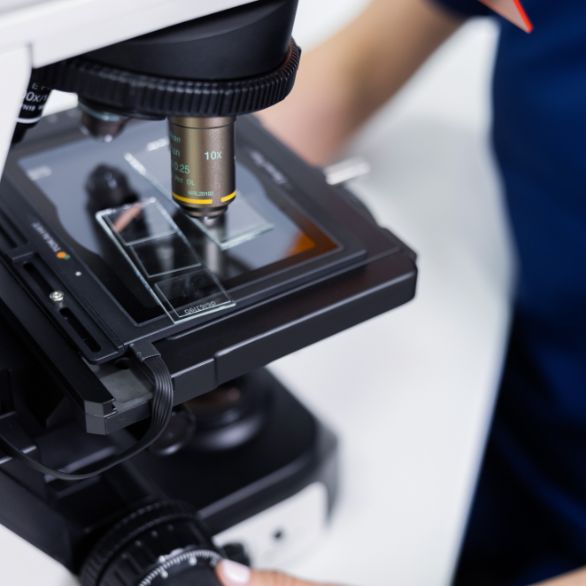What is DFI?
The DNA Fragmentation Index (DFI) is a molecular test that measures the percentage of spermatozoa with fragmented or damaged DNA. These sperm cells have undergone apoptosis (programmed cell death), meaning they are on the path to self-destruction. Although these spermatozoa may appear functional, they are more likely to die off prematurely.

Why is this examination important?
The genetic integrity of sperm is crucial for the healthy development of an embryo. Spermatozoa with fragmented DNA can lead to embryos with poor prognoses, often resulting in developmental arrest or miscarriage.
A high DFI is a significant factor in male infertility, which conventional sperm analysis may not detect. Men with an elevated DFI have a reduced chance of achieving a healthy pregnancy, as a higher proportion of their sperm carry damaged DNA.
How is it performed?
For the examination, a semen sample is required after 2-3 days of abstinence from ejaculation. The sample undergoes molecular processing, during which abnormal sperm cells are identified by their fluorescence under a specialized microscope. The results of the examination are presented as the DNA Fragmentation Index - % DFI, indicating the percentage of spermatozoa with fragmented DNA.
<15% DFI | high fertility potential | |
>15% to <20% DFI | good fertility potential | |
>20% DFI | low fertility potential |
Who should undergo this test?
Men who experience:
- Unexplained infertility
- Recurrent miscarriages
- Abnormal semen analysis
- Advanced age
- Have varicocele
- Exposure to harmful substances
- Failed assisted reproduction attempts
When should the examination be conducted?
Understanding the integrity of sperm DNA is crucial for diagnosing, managing, and treating male infertility. An accurate diagnosis made early in the process can save time, money, and energy, and prevent the frustration and despair that often accompany prolonged uncertainty. While this examination can be conducted at any stage of infertility investigation, it is most beneficial to undergo it early on.


What are the main causes of fragmentation?
The primary cause of DNA damage is oxidative stress. Other factors include disruptions in apoptosis regulation or defects in topoisomerase activity. The presence of an increased percentage of sperm with fragmented DNA may be due to:
- Infections, inflammations, and high fever
- Increased temperature in the testes
- Use of medications and/or narcotics
- Poor diet
- Smoking
- Exposure to chemical-toxic substances
- Air pollution
- Advanced age
- Varicocele

Is there treatment available?
Yes, treatment options are available to address DNA fragmentation. Lifestyle and dietary changes, including the intake of antioxidants, have been shown to reduce DNA fragmentation levels by up to 25%. Additionally, treating infections with antibiotics and repairing varicocele can significantly improve sperm DNA integrity.